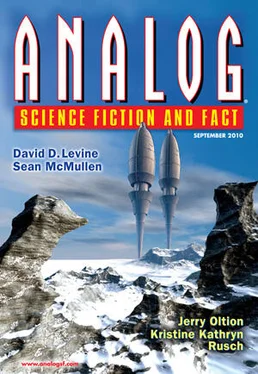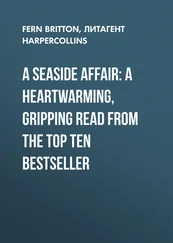Jerry Oltion - The View From the Top
Здесь есть возможность читать онлайн «Jerry Oltion - The View From the Top» весь текст электронной книги совершенно бесплатно (целиком полную версию без сокращений). В некоторых случаях можно слушать аудио, скачать через торрент в формате fb2 и присутствует краткое содержание. Год выпуска: 2010, Издательство: Dell Magazines, Жанр: Фантастика и фэнтези, на английском языке. Описание произведения, (предисловие) а так же отзывы посетителей доступны на портале библиотеки ЛибКат.
- Название:The View From the Top
- Автор:
- Издательство:Dell Magazines
- Жанр:
- Год:2010
- ISBN:нет данных
- Рейтинг книги:5 / 5. Голосов: 1
-
Избранное:Добавить в избранное
- Отзывы:
-
Ваша оценка:
- 100
- 1
- 2
- 3
- 4
- 5
The View From the Top: краткое содержание, описание и аннотация
Предлагаем к чтению аннотацию, описание, краткое содержание или предисловие (зависит от того, что написал сам автор книги «The View From the Top»). Если вы не нашли необходимую информацию о книге — напишите в комментариях, мы постараемся отыскать её.
The View From the Top — читать онлайн бесплатно полную книгу (весь текст) целиком
Ниже представлен текст книги, разбитый по страницам. Система сохранения места последней прочитанной страницы, позволяет с удобством читать онлайн бесплатно книгу «The View From the Top», без необходимости каждый раз заново искать на чём Вы остановились. Поставьте закладку, и сможете в любой момент перейти на страницу, на которой закончили чтение.
Интервал:
Закладка:
The View From the Top
by Jerry Oltion
The picture of his son caught Michael by surprise. He’d been reading Melissa’s email, smiling at her account of another day spent answering school kids’ questions about the International Space Station, when he’d paged down and there was David looking out of the screen at him. He’d clearly been playing; his hair was tousled and his cheeks were flushed red in the autumn chill. It was such a wonderfully stereotypical photo that Michael laughed, but his laughter caught in a lump in his throat and before he knew what was happening he was in tears, crying quietly there in his corner of the Zvezda Module.
He turned toward the bulkhead so neither Larisa nor Quentin could see him. Thank goodness there weren’t any cameras in the crew quarters. He could see the headlines now: NASA Sends Crybaby to Space; Blubbering Biologist Embarrasses Entire Nation .
He sniffed his suddenly runny nose and dabbed at his eyes with his shirtsleeve. Tears didn’t run in free fall; they built up into big globs that eventually broke free and quivered their way around the hab module until they eventually got sucked into one of the myriad circulation fans. Not a problem if the fan was just blowing into an air recycler—those were designed to deal with high humidity—but most of the fans on board cooled electronic equipment. Splashing salt water on a live circuit could make more than just Michael cry.
He looked at David once more, then closed the lid on his laptop computer. He could read the rest of Melissa’s email later, after he’d regained his composure.
Deep breaths helped a little. It was an old trick he’d learned years ago, back when he’d been teased mercilessly in grade school for his emotional outbursts. His unfortunate last name, Bebe, had provided the perfect nickname for his tormenters—”Baby Bebe”—and try as he might to suppress the tears, it wasn’t until he’d learned to fight that they finally left him alone.
Exercise had helped him then. Maybe it would help now. He pushed himself over to the stationary bicycle and strapped in, set the resistance to “10,” and began pedaling his way around the Earth. Maybe if he worked up enough of a sweat, Larisa and Quentin wouldn’t notice his tears.
Half an hour later he was exhausted enough to have an excuse for weeping, but though he could still feel the outburst lurking there beneath the surface, he seemed to have beaten it into submission for the moment.
Showering in space was both a luxury and a pain. No matter how well you sealed the compartment, water always got loose and you wound up chasing it around with your towel. In the month he’d been on board, Michael had learned to scrape himself clean with a wet cloth instead. He was toweling off when Quentin drifted into the module.
“How’s it hanging?” Quentin asked, the same question he always asked, no doubt because it was even more inane than usual in free fall.
“Good,” Michael answered automatically. Both of them spoke loudly, not with macho bravado but out of necessity. All the cooling fans and circulation fans on board the ISS gave it the background ambience of a railroad yard.
“Yeah?” Quentin let the word hang between them for a moment, an invitation to talk if Michael wanted to.
“Yeah, things are actually… actually just about perfect. I’m in space! It’s been my dream for as long as I can remember.”
Quentin grinned. “Mine too. It’s not quite the Buck Rogers scout ship I imagined as a kid, but here we are. I’m kind of sorry to be going home next month.”
He’d been on board for five months already. Duty tours had settled down to a regular six-month schedule now that the Russians were responsible for all the flights. Michael had come up with the last supply rocket, and the cosmonaut he’d replaced had ridden it back down. Quentin would go on the next one. Two months after that, Larisa would go, and Michael would be the old-timer on board until his replacement came.
Quentin gestured at the walls, festooned with equipment Velcroed, tied, or simply wedged into place against every available surface. “Good thing the place looks like such a dump in the photos, or the competition for space up here would be even worse than it is, eh?”
“Right, good thing,” Michael said.
“Enjoy it while you’ve got it,” Quentin said.
Michael tried. He succeeded, too, but the problem was, he seemed to be enjoying it too much. In the days that followed, he teared up over the most trivial things. The sight of Earth curving away from him out the window, the smell of dinner in the otherwise nearly antiseptic space-station air, even the sight of the tiny crocuses in the Ukrainian high-school experiment that he, as both the biologist and the low man on the totem pole, had to tend each day.
It was a simple experiment. The high school class had decided to watch one of their country’s native plants through an entire growth cycle and see how the lack of gravity affected it. They had chosen Crocus angustifolius , the “cloth of gold” crocus, because it was small, responded well to cultivation, and had pretty yellow blossoms. They had sent up a cylinder about a meter long and a third that wide, already planted with half a dozen corms that had sprouted within days after Michael had watered them and switched on the light.
The whole experiment had nearly come to an early end. On his first full day on board the station, when he was still getting used to maneuvering in free fall, Michael had underestimated his inertia and had careened into the experiment rack, busting a big chunk out of the Plexiglas cover with his elbow. He had duct-taped it back together, but it didn’t fit tight anymore, so he had to be extra careful when he watered the plants.
Nobody had said anything, but he could imagine what went unsaid. The hotshot biologist had nearly blown the simplest experiment on the station. Wonder how he’ll do on the DNA sequencer?
Not half bad, it turned out, except for the day when he burst into tears at the sight of a zebrafish genome. One of the fish strains that had been on board for nearly five years was developing longer, lacier fins, and he had found the genetic sequence that controlled it. Researchers on the ground had long ago shown that the fgfr1 gene affected fin growth and regeneration, but this was the first proof that evolutionary pressure could switch it on. When Michael had realized he was looking at the very blueprint of evolving life, he’d lost his self-control and the next moment he was crying like a mother at a wedding.
Fortunately, he was alone this time. Larisa was asleep in the crew quarters, and Quentin was across Node 2 in the Kibo module. Michael sniffed and dabbed at his eyes and bit his lip and clenched his fists and took deep breaths, and he eventually brought himself under control again, but later that day he got out the medical kit and self-prescribed an anti-depressant. He was supposed to confer with Mission Control first, but like any astronaut from Alan Shepard onward, he had learned not to involve the flight surgeon’s office in anything he didn’t have to. The only thing those guys ever did for astronauts was ground them if their health wasn’t absolutely perfect. And an astronaut who couldn’t control his emotions was sure to be grounded. If word of this got down to Mission Control, it would be Michael, not Quentin, who would be headed back to Earth on the next supply ship.
Antidepressants didn’t just stop depression. They also moderated highs. They clipped both ends of the emotional spectrum, so Michael figured they might help him cope with his overwhelming feelings of joy. For several days they seemed to do so, which was probably the placebo effect since the package insert said it usually took at least a week for anti-depressants to kick in. Then one of the crocuses bloomed, and Michael dissolved at the sight of its pale yellow blossom reaching out toward the grow-light and just touching the top of its Plexiglas dome.
Читать дальшеИнтервал:
Закладка:
Похожие книги на «The View From the Top»
Представляем Вашему вниманию похожие книги на «The View From the Top» списком для выбора. Мы отобрали схожую по названию и смыслу литературу в надежде предоставить читателям больше вариантов отыскать новые, интересные, ещё непрочитанные произведения.
Обсуждение, отзывы о книге «The View From the Top» и просто собственные мнения читателей. Оставьте ваши комментарии, напишите, что Вы думаете о произведении, его смысле или главных героях. Укажите что конкретно понравилось, а что нет, и почему Вы так считаете.












